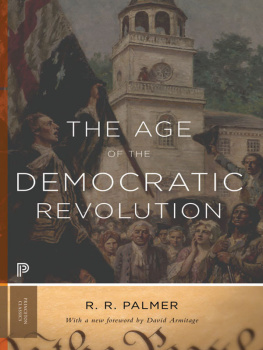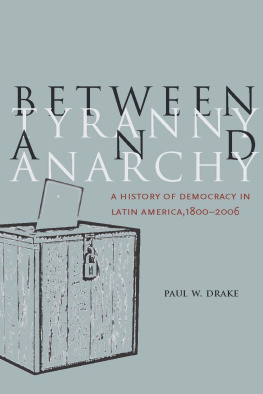
THE AGE OF THE DEMOCRATIC REVOLUTION
THE AGE
OF THE
DEMOCRATIC
REVOLUTION
________________________________________
A Political History of Europe and America, 17601800
R. R. PALMER
With a new foreword by David Armitage
PRINCETON UNIVERSITY PRESS
PRINCETON AND OXFORD
Copyright 2014 by Princeton University Press
Foreword copyright 2014 by David Armitage
Requests for permission to reproduce material from this work should be sent to Permissions, Princeton University Press
Published by Princeton University Press, 41 William Street, Princeton, New Jersey 08540
In the United Kingdom: Princeton University Press, 6 Oxford Street, Woodstock, Oxfordshire OX20 1TW
press.princeton.edu
Cover art: Top: Detail of Libertys Pulpit by Jean Leon Gerome Ferris, 19th century.
Courtesy of SuperStock/Getty Images. Bottom: Detail of United States Constitution.
Courtesy of Thinkstock. Design by Michael Boland for thebolanddesignco.com.
All Rights Reserved
Library of Congress Control Number 2014933004
ISBN 978-0-691-16128-0
First Princeton Classics edition, with a foreword by David Armitage, 2014
This book includes the complete text of the work originally published in two volumes as The Age of the Democratic Revolution: The Challenge (copyright 1959 by Princeton University Press) and The Age of the Democratic Revolution: The Struggle (copyright 1964 by Princeton University Press).
British Library Cataloging-in-Publication Data is available
This book has been composed in Adobe Caslon Pro and Avenir LT STD
Printed on acid-free paper.
Printed in the United States of America
10 9 8 7 6 5 4 3 2 1
The French Revolution had no territory of its own; indeed, its effect was to efface, in a way, all older frontiers. It brought men together, or divided them, in spite of laws, traditions, character and language, turning enemies sometimes into compatriots, and kinsmen into strangers; or rather, it formed, above all particular nationalities, an intellectual common country of which men of all nations might become citizens.
When we look away from those accidental features which modified its appearance at different times and in various countries, and consider the Revolution only in itself, we see clearly that its effect was simply to abolish those political institutions which had prevailed for centuries among most European peoples that it entirely destroyed, or is still destroying (for it still goes on) everything which in the old society arose from feudal and aristocratic institutions.
ALEXIS DE TOCQUEVILLE
CONTENTS
________________
MAPS
________________
FOREWORD
________________
The late eighteenth century has long held a special place in narratives of the making of the modern world. Contemporaries from Bengal to Boston, and in Paris and Patna, were certain theirs was an age of revolutions. Empires collided and crumbled in the Americas and South Asia. A new order of the ages seemed to be rising from the wreckage of old regimes. And huge changes were afoot in commerce and manufactures, warfare and communications, government and finance. Whether these upheavals amounted to a single seismic shift was not so clear. Did the periods revolutions all point in the same direction? Or were they fundamentally distinct? The question of one revolution or manyan age of revolutions or a revolutionary agewould recur across the next two centuries.
R. R. Palmers The Age of the Democratic Revolution (195964) is the pivotal scholarly contribution to that debate, a monument of anglophone historical writing, and the most coherent argument for the essential unity of the revolutionary era. The work was garlanded and assailed, revered and ignored, but it has never been out of print. The Age of the Democratic Revolution has striking omissions and bears signs of its times, but it is more widely discussed, and arguably more relevant, now than at any time since it first appeared half a century ago.
Robert Roswell Palmer was born in 1909 and won a scholarship to the University of Chicago, where he studied with Louis Gottschalk, one of the earliest professional historians of the French Revolution in the United States. Gottschalk urged Palmer to go to Cornell for graduate work under his own mentor, Carl Becker, an intellectual historian of both the American and French Revolutions. From Gottschalk, Palmer had acquired his interests in the age of revolutions and in the shaping force of ideas in history; with Becker, he would develop his focus on exchanges across the Atlantic, a skeptical liberalism, and a commitment to history as a critical discipline aimed at a broad reading public. After taking up a lectureship at Princeton in 1936, Palmer earned his academic spurs with two accomplished monographs: Catholics and Unbelievers in Eighteenth-Century France (1939) and Twelve Who Ruled: The Committee of Public Safety during the Terror (1941). Poor eyesight kept him from active combat in the Second World War, and he worked in Washington, DC, as a historian in the Army Ground Forces Command, where he wrote most of two volumes on the recruitment and training of ground troops in the conflict. After His magnum opus on the democratic revolutionPalmer took the term from the French revolutionary lawyer Antoine Barnavewould be the result.
Palmers masterpiece sprang from the conjunction of two revolutionary moments, past and present. The first was what he called the late eighteenth-century Revolution of Western Civilization in Europe and North America. The second was the great revolution of his own times in Asia, Africa, and Latin America: Let us use the revolutionary era to investigate what is most on our minds, to find out what a world is like that is divided by revolution and war. The two movements were continuous yet counterposed, because the revolution of the West had created the tools for the ongoing revolution against the West. Palmer argued that the goal of both was equality, a fundamental value that had first been widely elaborated between 1760 and 1800, with lasting legacies for succeeding centuries: All revolutions since 1800, in Europe, Latin America, Asia, and Africa, he wrote at the very end of The Age of the Democratic Revolution, have learned from the eighteenth-century Revolution of Western Civilization. That judgment might seem guilty of almost every current scholarly sinEurocentrism, essentialism, teleology, diffusionismbut it captured the essence of Palmers endeavor: to understand the present through the past with the perspective of the longue dure.
Most professional historians worship the archive, suspect synthesis, and shun presentism. Not so Palmer: he spent only a year in French collections when researching his first book, worked mostly from published sources, and was adamant that historians must use their knowledge to illuminate contemporary concerns. As he was embarking on his grand project, he told an interviewer: Historians address themselves to the hard questions of policy as against what was narrative history. Today history is interpretative and critical.
His history was not an apology for burgeoning contemporary international institutions: it was more an elegy for a world that had been lost but whose promises were still in the process of being fulfilled.
The first volume of The Age of the Democratic Revolution focused on the American Revolution; the second, on the French Revolution and its aftermath. Two timely themes linked them: the Tocquevillian topic of ever-expanding equality and the more immediate questions of how revolution spread and how it was repelled. In volume 1,
Next page











